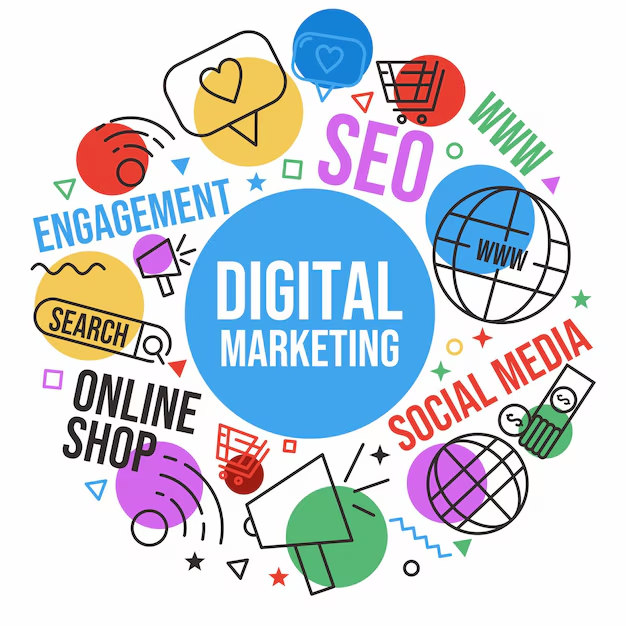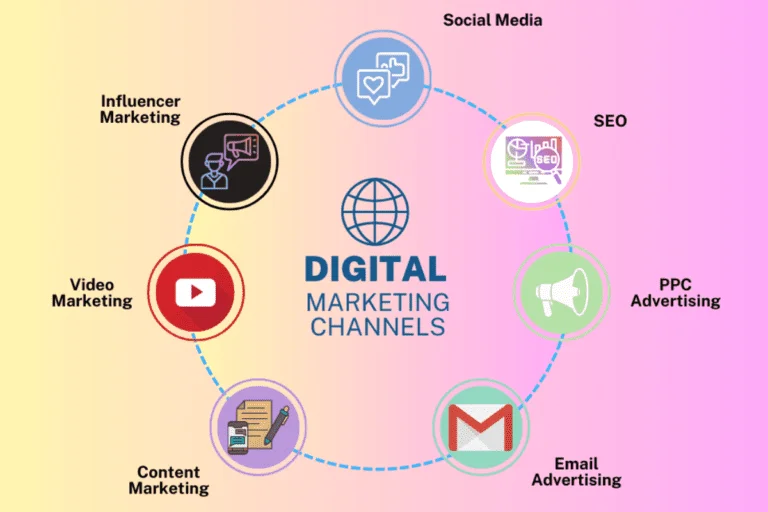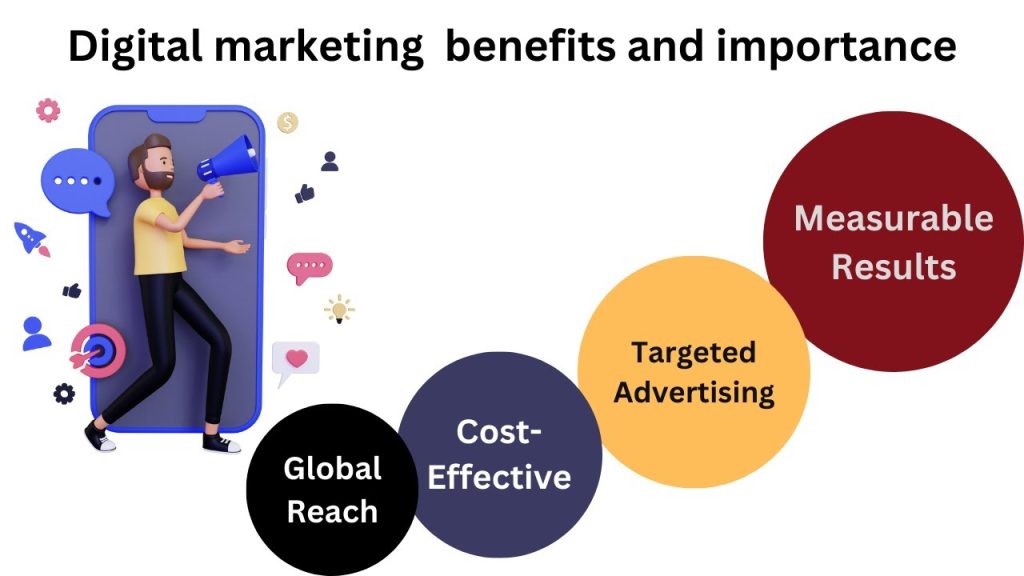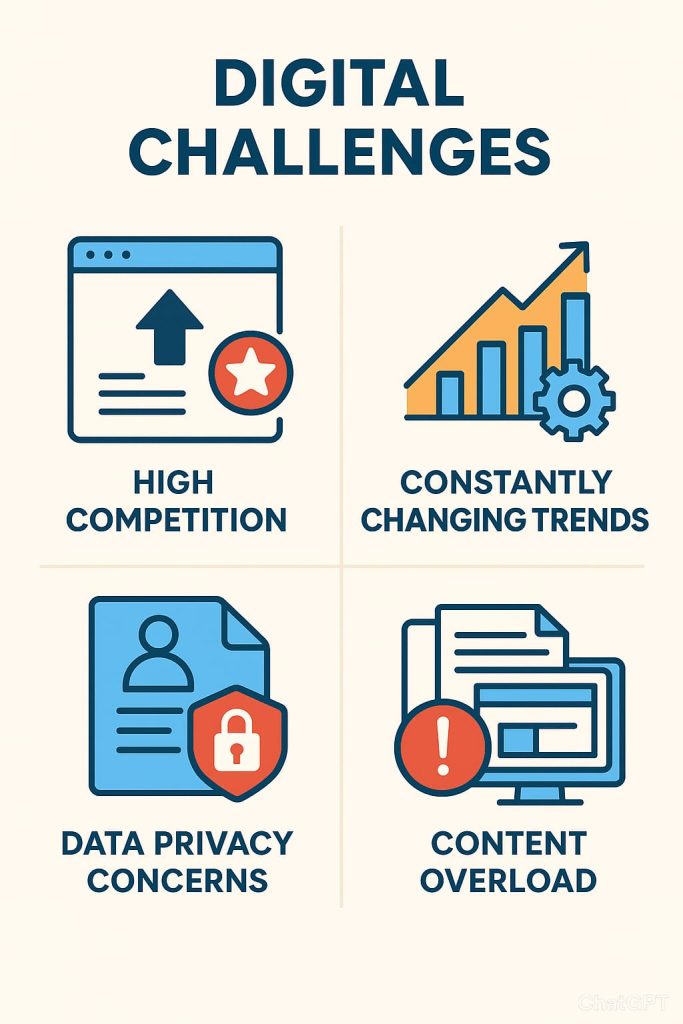
Digital Marketing is the practice of promoting products or services using online channels. It reach more customers, increase brand awareness, and It helps businesses grow sales. This beginner-friendly guide will explain what digital marketing is, its types, and benefits
Definition of Digital Marketing.
Digital marketing refers to all marketing efforts that use the internet or electronic devices.businesses leverage digital channels such as search engines, social media, email, and websites to connect with current and prospective customers, build relationships, increase brand awareness, and drive sales or engagement through targeted, measurable campaigns
Why Digital Marketing is Important?

Traditional marketing is no longer enough. Digital marketing allows businesses to reach a wider audience, track results in real-time, and engage with customers directly. It is cost-effective, measurable, and provides better opportunities for growth. Moreover, It helps businesses stay competitive in today's fast-paced digital world, target the right audience with precision, anti adapt strategies based on data and customer behavior.

Types of Digital Marketing.
1. Search Engine Optimisation (SEO) – SEO is the process of optimising your website to rank higher in search engines, Increasing organic traffic.
2. Search Engine Marketing (SEM) – SEM involves paid advertising on search engines like Google to appear in top search results.
3. Social Media Marketing (SMM) – SMM is promoting your business on platforms like Facebook, Instagram, and Linkedin to reach and engage your audience.
4. Content Marketing-Creating valuable content such as blogs, videos, and infographics to attract and retain customers.
5. Email Marketing – Sending targeted emails to your audience to promote products, share news, or build relationships.
Benefits of Digital Marketing.

1. Wider Reach: igital marketing allows businesses to connect with global customers online, breaking geo geographical carriers, Unlike traditional marketing, which is often limited to a local audience, digital markeang enables brends to reach peopia anywhere in the world, at any time through we webaltes, social meat platforms, search engines, and email campaigns. This wider reach presses the chances of attracting more patent customers ana expanding the business beyond local markets.
2. Cost-Effective: Digital campaigns are casper than traditional marketing and give better retums on Investment. Unlike TV, print, or radio ads, online marketing allows businesses to run ads within any budget, pay only for actual clicks or views, and reach a highly targeted audience. This means even small businesses can compete with larger companies, maximise their marketing spend, and achieve measurable results without wasting resources.
3. Targeted Marketing: Reach the right audience based on age, location, Interests, or behavior for better results, ay targeting specific groups, businesses can ensure their message reaches people who are most likely to be interested in their products or services. This Increases engagement, reduces wasted ad spend, and improves the chances of converting prescents Inte loyal castomers ameking marketing efforts more effolent anu effective
4. Measurable Resulta: Analyse metries live clicks, sends, and saleu to understand whe! works and aplimite strategies. Cigital marketing provides detailed insights into every car pelga, allowing businesses to see which ads, content, or cha mols are performing best. This data driven approach helps in making informed decisions, improving future campaigns, Increasing ROI, and ensuring that marketing efforts are continuously refined for maximum Impact
Challenges in Digital Marketing.

1. High Competition: The online space is crowded, making it difficult for businesses to stand out.
2. Constantly Changing Trends: Digital platforms frequently update algorithms and tools, requiring marketers to stay updated.
3. Data Privacy Concerns: Collecting and using customer data comes with legal responsibilities and privacy issues.
4. Content Overload: Users are exposed to a large amount of information daily, making it challenging to capture their attention.
CONCLUSION
Digital marketing has become an essential part of modern business growth. With the power of online platforms, businesses can reach a larger audience, build strong customer relationships, and measure their performance effectively. Unlike traditional marketing, it is cost-friendly, fast, and more engaging. Whether you are a small business owner or a professional, mastering digital marketing opens endless opportunities in today’s digital-first world, where customers are constantly online, trends shift rapidly, and competition is high. Embracing digital strategies not only helps brands stay relevant but also ensures long-term success in an ever-evolving marketplace.